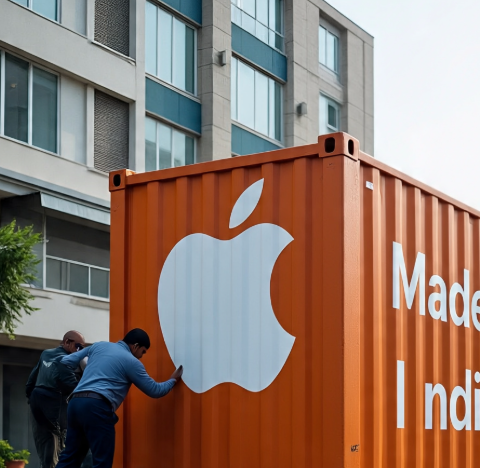New Delhi, June 13 — Apple has shifted its iPhone manufacturing from China to India amid trade tensions, and now 97% of Foxconn’s India-made devices are being exported to the U.S. According to customs data, iPhones worth $3.2 billion were exported in March–May 2025, of which ₹97% were for U.S. markets — much more than last year’s 50.3%.
Rapid Shift to India: Facts & Figures
May 2025 alone exports nearly $1 billion, second highest after March’s record of $1.3 billion.
Foxconn and Tata Electronics both increased U.S.-bound shipments; Tata sent 86% of its March–April shipments to the U.S.
Global output projection: Share of Made-in-India iPhones expected to grow from 18% in 2024 to 25–30% in 2025.
🛫 Logistics & Strategy: Speed is the Key
Apple reduced Chennai airport customs clearance time from 30 hours to 6 hours — so shipments could reach the U.S.
The company also used chartered flights for some exports — including iPhones worth more than ₹200 crore boarded the plane in March.
Why This Shift? Tariffs, Politics & Diversification
Trump-era U.S. tariffs imposed on goods imported from China – Apple turns to India sourcing to deal with it
Trump has also publicly warned that Apple should “stop manufacturing in India” and “increase manufacturing in the U.S.”
Despite the pause on reciprocal tariffs, Apple is diversifying its strategy as it is an economic solution despite production costs now being slightly higher in India.
India: Emergent iPhone Hub, but Still Facing Hurdles
PM Modi’s “Make in India” push is attracting companies like Apple — but high duties on phone components are a major challenge
reuters.com
Despite these barriers, Apple and Foxconn have decided to expand facilities in India — and Foxconn will start shipments from June 2025 at a new plant in Karnataka.
What This Means Going Forward
Apple has a roadmap to reduce China-dependence — the share of India-made iPhones could reach 3 in 10 by 2026.
The impact of this shift will be significant on U.S. iPhone prices, supply chain resilience, and India’s rise as a global manufacturing hub.
Bottom Line:
Apple has made strategic moves — to avoid tariffs, risk diversification, and give India a strong position as an alternate manufacturing base.
But there are challenges — component duties, logistical complexities and geopolitical pressures, which still don’t factor into the company’s roadmap


















+ There are no comments
Add yours